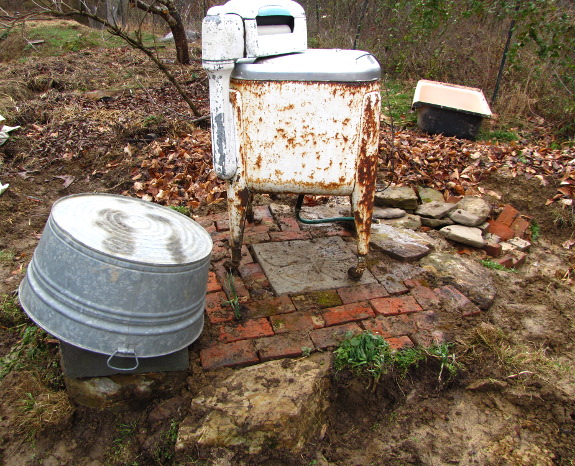
Our new laundry nook

B.J. helped me move our
old wringer washer onto its new stone
patio. Now the
question is, what color(s) should we paint it? With honeybees on
his mind, B.J. suggested black and yellow stripes.
We like having a few extra chicken waterers on hand so we can put one in
with any hen in isolation, have a separate one for chicks, and still
keep the main flock going.
Want more in-depth information? Browse through our books.
Or explore more posts by date or by subject.
About us: Anna Hess and Mark Hamilton spent over a decade living self-sufficiently in the mountains of Virginia before moving north to start over from scratch in the foothills of Ohio. They've experimented with permaculture, no-till gardening, trailersteading, home-based microbusinesses and much more, writing about their adventures in both blogs and books.
Want to be notified when new comments are posted on this page? Click on the RSS button after you add a comment to subscribe to the comment feed, or simply check the box beside "email replies to me" while writing your comment.

I would start by roughing up the old paint with sandpaper. That will also take care of loose rust. Treat the remaining corroded spots with a rust converter. You can see it in action here. That will convert the rust into an inert layer. Then apply a primer, at least on the parts that were treated with the rust converter. But your machine is so corroded it's probably easier to do the whole surface. Then apply a good topcoat.
If you want your washer to last, choose a primer and topcoat suitable for outdoor use on metal.
Anna --- Well, you can go crazy, or simple. In the end, you want to get rid of anything that's loose and any films (dust, oils, etc.) that will prevent the new paint from bonding to the old paint. You also usually want to roughen the surface slightly to promote bond.
I would start by wire brushing everything. Sounds like a nice job for an intern. (Sorry, BJ, but somebody's got to do it! <g>) Hand brushing with a good, stiff bristled brush should be fine for what you want. If you go crazy, they do make serious powered wire brushes intended, for instance, for surface prep on structural steel. Get off any big bits (rust, paint) that are not tightly adhered.
After the wire brushing, sanding it all over will help roughen any too smooth portions. After sanding, you'll want to get off the dust. On indoor walls, I'll take a bucket of water and a sponge and wipe them down, but outside, you can probably just blast it with a hose.
Also, primer is your friend. <sigh> It's another coat of painting, but after attempting a project without primer (I was just going right over a previous color of paint) and not being satisfied with the results, I'm now resigned to needing it on all jobs. On this job, though, with part rust and part old paint, it wouldn't irritate me so much.
Can't wait to see the progress photos and final results!
As Seth says, surface preparation is absolutely essential to a lasting paint job.
Specifically, you need to get rid of all of the rust. Let me explain; What we call rust is an iron oxide that forms in the presence of oxygen and moisture. The problem is that this oxide has a larger volume than the original metal. That's one of the reasons that it flakes off. Next is the fact that paint usually isn't a complete moisture or oxygen barrier: it is too thin, and not the right material.
So if you just paint over a rusted spot, moistere and oxygen can still get to it, leading to more rust and the paint flaking off again to reveal the rusty spot once more. So you really need to remove all rust, or make it inert with a converter before painting. Otherwise your work won't last.
As for the primer, it is also necessary. The topcoat needs to have and hold a certain color, gloss, have scratch resistance and withstand UV. Making it do all that and adhere to many different substrates is too difficult. That is where the primer comes in. Each primer is specially designed to adhere well to both a certain substrate and paint. So there are different primers for different substrates. It is probably best to buy the primer together with the topcoat from the same supplier, so you know that they will go together well.
If you want the washer to last, I would suggest disassembling it. Otherwise you won't be able to do a decent paint job. If there is someone in the neighbourhood who does sandblasting, that is an excellent way to get rid of old paint and rust! Otherwise brush/sand the washer. Then wipe it down with pre-paint to get off all dust and fatty acids from your hands that can interfere with paint adhesion. From that point on, you shouldn't touch it with bare hands until the topcoat is on and dry. Apply a suitable primer and let it cure. Then apply a topcoat and let that cure.
A topcoat that is used for boats (e.g. a two component epoxy) is suitable for outside use and would probably last for a long time. Keep in mind that most paints have a minimum temperature that they need to dry/cure correctly.
If you don't want to go through all this trouble, you could have it powder coated. That will also last a long time, but it's not something you can do yourself.